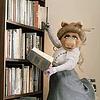Take a photo of a barcode or cover
163 reviews for:
Scandals of Classic Hollywood: Sex, Deviance, and Drama from the Golden Age of American Cinema
Anne Helen Petersen
163 reviews for:
Scandals of Classic Hollywood: Sex, Deviance, and Drama from the Golden Age of American Cinema
Anne Helen Petersen
A primer for the Hollywood machine and the scandals that shaped the narrative of Classic Hollywood.
I discovered Anne Helen Petersen and her brand of celebrity history over on The Hairpin. I was never a religious reader of her articles; there just isn’t enough time to read all the things, all the time. But, when I found out that she was putting together a book based on classic scandals I added it to my list and kept an eye out. The problem I had though was that while the blurb above promises sensationalism made smart, we lost some of the fun along the way. Part of what kept me enthralled on the long reads over at The Hairpin was the nitty gritty detail over the history with the combination of the sarcastic. Much of the sarcasm is missing from the book, unfortunately.
https://faintingviolet.wordpress.com/2015/04/07/scandals-of-classic-hollywood-cbr7-26-half-cannonball/
I discovered Anne Helen Petersen and her brand of celebrity history over on The Hairpin. I was never a religious reader of her articles; there just isn’t enough time to read all the things, all the time. But, when I found out that she was putting together a book based on classic scandals I added it to my list and kept an eye out. The problem I had though was that while the blurb above promises sensationalism made smart, we lost some of the fun along the way. Part of what kept me enthralled on the long reads over at The Hairpin was the nitty gritty detail over the history with the combination of the sarcastic. Much of the sarcasm is missing from the book, unfortunately.
https://faintingviolet.wordpress.com/2015/04/07/scandals-of-classic-hollywood-cbr7-26-half-cannonball/
A fascinating look at early Hollywood and the ways in which the studio system and the press shaped the public conception of what a star should be with special attention being given to issues of gender, sexuality, and body image. At times funny, sad, and infuriating. A really well written and enjoyable book.
AHP does a great job of balancing the popular and scholarly, while covering done lesser-known scandals. I am already selfishly hoping for a sequel!
While an undeniably interesting depiction and very brief overview of a few select scandals and lives of Hollywood, some of the stories are told in a way to exaggerate the ending conclusions of the chapters (which all end in a moralizing reflection of society, à la Aesop’s Fables). I can’t fault this too much, as many of the stories are based on the judgemental and rabble rousing depictions of the press, but I only wish that more nuance was shed on the stars themselves; somehow, despite this book attempting to get at something deep behind the scandals, it sometimes fails spectacularly at clarifying the characters of its subjects.
Especially in the “three angry men” section; I found the Marlon Brando chapter to be somewhat judgemental. What right did the author have to judge his later filmography? Or course, he made them for money and not artistry, but is there an issue in that? And can you call his social justice interventions “middling” despite his devotion to the native cause? And ultimately, the story ended up framing Brando as a failure of his large ego- it also shook off the insane success of “The Godfather” and the renaissance of Brando’s later life, citing “Indeed, for all Brando’s gravitas in The Godfather and Last Tango in Paris, both performances lack the vibrancy and vitality of his work in the early fifties. Instead, they seem to spring from a well of shame and despair, appealing to the audience to mourn an ideal of masculinity gone to seed.” Uh… I mean, being 2x older and acting out the roles of middle-aged and older men would obviously result in a lack of “vibrancy and vitality” regardless. Also where did the “shame and despair” thing even come from? Understandably, Brando’s performance in Tango could be argued to have been drawn from his trauma and experiences, but the filming of the Godfather was a delight.
Assertions and other pieces of speculation from the author abound many of the stories, blurring the line between fact and fiction. For instance, she also insists that Montgomery Clift died because of his insane devotion for art, which undeniably fits into the “tragic artist” narrative that surrounds him; yet, to frame such speculation as a statement or fact is perhaps not in good taste.
At the same time, I do recognize that the author’s intention is not a biographical one, but rather, the scandals are narrated to show the values of society through its reactions to popular events. And in this sense, she did this excellently, but I would suggest doing some further reading on your own on these stars and their scandals.
Especially in the “three angry men” section; I found the Marlon Brando chapter to be somewhat judgemental. What right did the author have to judge his later filmography? Or course, he made them for money and not artistry, but is there an issue in that? And can you call his social justice interventions “middling” despite his devotion to the native cause? And ultimately, the story ended up framing Brando as a failure of his large ego- it also shook off the insane success of “The Godfather” and the renaissance of Brando’s later life, citing “Indeed, for all Brando’s gravitas in The Godfather and Last Tango in Paris, both performances lack the vibrancy and vitality of his work in the early fifties. Instead, they seem to spring from a well of shame and despair, appealing to the audience to mourn an ideal of masculinity gone to seed.” Uh… I mean, being 2x older and acting out the roles of middle-aged and older men would obviously result in a lack of “vibrancy and vitality” regardless. Also where did the “shame and despair” thing even come from? Understandably, Brando’s performance in Tango could be argued to have been drawn from his trauma and experiences, but the filming of the Godfather was a delight.
Assertions and other pieces of speculation from the author abound many of the stories, blurring the line between fact and fiction. For instance, she also insists that Montgomery Clift died because of his insane devotion for art, which undeniably fits into the “tragic artist” narrative that surrounds him; yet, to frame such speculation as a statement or fact is perhaps not in good taste.
At the same time, I do recognize that the author’s intention is not a biographical one, but rather, the scandals are narrated to show the values of society through its reactions to popular events. And in this sense, she did this excellently, but I would suggest doing some further reading on your own on these stars and their scandals.
informative
slow-paced
Educational but boring! Surprising because I love her weekly essays.
Pretty good! Stories of the Hollywood machine, when the general public was kept in the dark about delinquent stars and their dalliances. Went on a bit long for me, though.
informative
slow-paced
I liked this. It’s not massively in depth and presumes some knowledge, but if you like old Hollywood and it’s characters/stories/scandals then it’s an interesting and fun read.
http://wordnerdy.blogspot.com/2014/09/2014-book-232.html
informative
reflective
medium-paced






